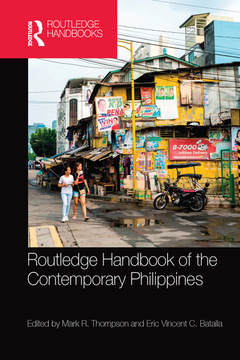Routledge Handbook of the Contemporary Philippines
Coordonnateurs : Thompson Mark, Batalla Eric Vincent

The Philippines is a fascinating example of a "poor country democracy" where issues of economic development and poverty, political participation and stability, as well as ethnicity and migration are crucial. The Routledge Handbook of the Contemporary Philippines provides a comprehensive overview of the current political, economic, social, and cultural issues of the country. The Handbook is divided into the following four sections concentrating on a different aspect of the Philippines:
- domestic politics;
- foreign relations;
- economics and social policy;
- cultures and movements.
In terms of domestic politics, chapters discuss clientelism, bossism, dynasties, pork barrel and corruption as well as institutions - the presidency, congress, the judiciary, the civil service, political parties, and civilian-military relations. The Philippines is confronted with many overseas challenges, with the foreign relations section focused on the country?s relationship with China, Japan, and the USA as well as assessing the impact of the Filipino diaspora community around the world. Regarding economics and social policy, authors examine industrial policy, capital flight, microfinance, technocracy, economic nationalism, poverty, social welfare programs, and livelihoods. The final section on Philippine cultures and movements highlights issues of customs, gender, religion, and nationalism while also examining various social and political forces - the peasantry, the middle class, indigenous peoples, NGOs, the left, trade unionism, the women?s movement, and major insurgencies.
Written by leading experts in the field, the Handbook provides students, scholars, and policymakers of Southeast Asia with an interdisciplinary resource on the evolving politics, society, and economics of the Philippines.
Introduction Part I: Domestic Politics 1.Clientelism Revisited, Masataka Kimura 2. Patrons, Bosses, Dynasties, and Reformers in Local Politics, John T. Sidel 3. The Party Political System, Allen Hicken 4. Combating Corruption, Jon S. T. Quah 5.The Civil Service: Weaknesses and Constructive Informal Practices, Rupert Hodder 6. House of Clans: Political Dynasties in the Legislature, Julio C. Teehankee 7. Pork Transmogrified: The Unending Story of Particularistic Spending, Ronald D. Holmes 8. Congress: Separate but not Equal, Diana J. Mendoza and Mark R. Thompson 9. The Presidency: a Relational Approach, Mark R. Thompson 10.The Judiciary under Threat, Eric Vincent C. Batalla, Michelle Sta. Romana, and Karen Rodrigo 11.Civil-Military Relations: Norming and Departures, Rosalie Arcala Hall
Part II: Foreign Relations 12. Foreign Relations between the Philippines and the United States, Howard Loewen 13.From Antagonistic to Close Neighbor: Twenty-first Century Philippine-China Relations, Renato Cruz de Castro 14. Towards Strategic Partnership: Philippines-Japan Relations after Seventy Years, Dennis D. Trinidad 15. Diaspora Diplomacy, Joaquin Jay Gonzalez III
Part III: Economics and social policy 16.Bypassing Industrial Development, Eric Vincent C. Batalla 17.Capital Flight, Edsel L. Beja Jr. 18. The Changing Configuration of Capitalism, Antoinette R. Raquiza 19.Economic Nationalism and its Legacy, Yusuke Takagi 20.Technocracy and Class Politics in Policy-Making, Teresa S. Encarnacion Tadem 21.The Allure of Pantawid Pamilya: The Conditional Cash Transfer Program, Ma. Victoria R. Raquiza 22.Informality and Legality in Women’s Livelihoods in Baguio City, B. Lynne Milgram 23.Persistent Poverty and Elite-dominated Policymaking, David G. Timberman 24.From Pamilya to Grasya: Microfinance, Asuncion Sebastian
Part IV: Cultures and Movements 25.A Syncretic Culture, Paul A. Rodell 26. Gender, Nation and Filipino Catholicism past and present, Coeli Barry 27. Between Rights Protection and Development Aggression: Indigenous Peoples, Oona Paredes 28.The Resilience of the Peasantry, Eduardo C. Tadem 29. The Middle Class in Society and Politics, Temario C. Rivera 30. NGOs in the post-Marcos Era, Gerard Clarke 31. Crossovers Double-Crossed: NGOs, Semi-Clientelism, and Political Reform, Ben Reid 32. The Left: Struggling to Make a Comeback, Nathan Quimpo 33. Trade Unions: "Free" but Weak, Carmel Veloso Abao 34. The Women’s Movement: Policy Issues, Influence and Constraints, Diana Mendoza 35. Bangsamoro Secessionism, Rizal G. Buendia 36. Moro Insurgency and Third Party Mediation, Bruce E. Barnes 37.The Problem with the National(ist) Method, Patricio N. Abinales
Mark R. Thompson is Professor and Head, Department of Asian and International Studies and Director of the Southeast Asia Research Centre at the City University of Hong Kong.
Eric Vincent C. Batalla is Professor and Chair of Political Science at De La Salle University, Philippines.
Date de parution : 06-2020
17.4x24.6 cm
Date de parution : 03-2018
17.4x24.6 cm
Thèmes de Routledge Handbook of the Contemporary Philippines :
Mots-clés :
MILF; Moro National Liberation Front; Partido Komunista Ng Pilipinas; Subnational Authoritarianism; Aquino III; Philippine Politics; Ancestral Domains; PDAF; Macapagal Arroyo Administration; Gdp Growth; Philippine Left; Aquino Administration; post-Marcos Era; Rodrigo Duterte; Vice Versa; Clark Air Base; Civil Society; Bbl; Religious Congregations; Colonial Administration; Political Dynasties; President Duterte; Pork Barrel Funds; Philippine Military Academy; Moro Nation



